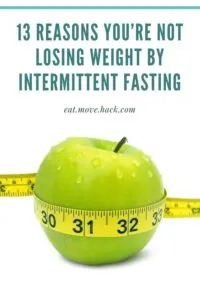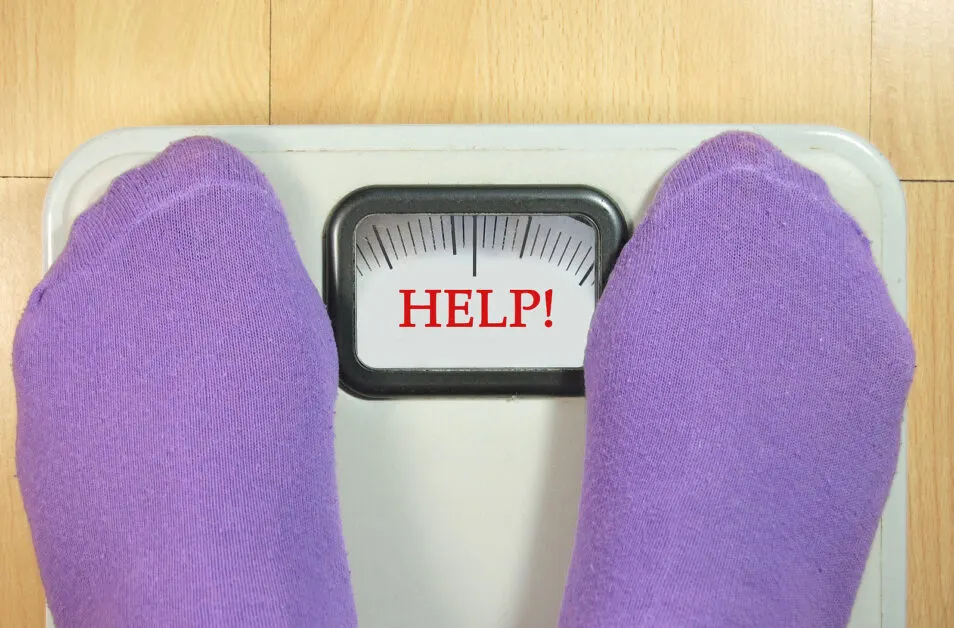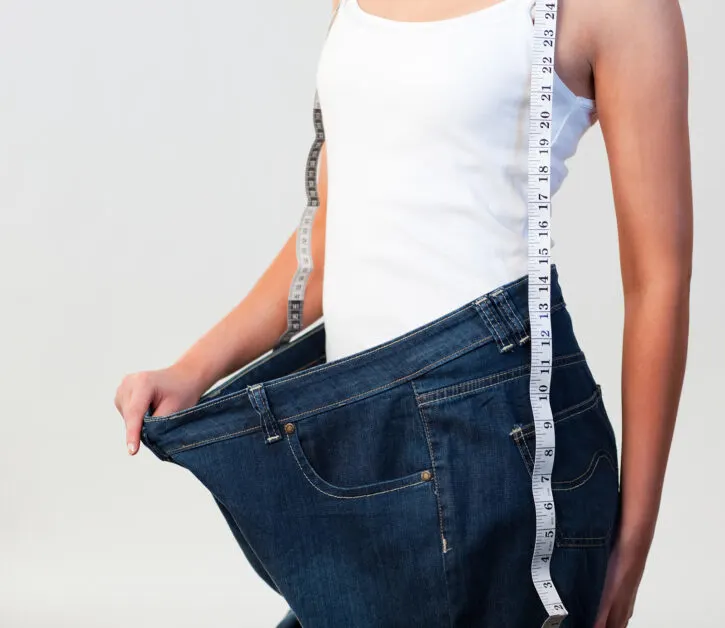Some of the links in this post are affiliate links. This means if you click on the link and purchase the item, we will receive an affiliate commission from the vendor at no extra cost to you. These business relationships allow us to keep bringing you great EatMoveHack content. All opinions remain our own.
13 Reasons You’re Not Losing Weight Intermittent Fasting: Break Your Stall
You started intermittent fasting because you wanted to trim your waistline and improve your health. The rules seemed clear and easy enough: With IF 16/8, you eat only during the permitted eight-hour window, and you should soon see the pounds drop. But things aren’t quite working out that way. Why are you not losing weight intermittent fasting 16/8?

We know how frustrating it can be to make big changes but not see the results you were hoping for. Does this mean that intermittent fasting isn’t right for you? Not at all. What usually happens is that despite your best efforts, something’s off, even when you think you’re doing everything right.
Remember the age-old adage about “calories in, calories out”? You might have thought that you could forget about it while practicing IF, but that’s unfortunately not the case. No matter what diet you follow, you will not lose weight if you eat more calories than you burn. So if you find that intermittent fasting is not working, you may just have to make some simple tweaks to get back on track. Check out our top 13 reasons for why you might not be losing weight while fasting to see if you’ve been making any of these mistakes, and then learn how to turn things around so you can achieve your weight loss goals.
1. You’re Binge Eating Because You Think You Can
We’re just going to come out and say it: If you find that you’re not losing weight while intermittent fasting 16/8, it could be because you’re simply eating too much — even if you’re doing it during your eating window. Don’t feel bad, because this is a mistake that lots of new dieters make. Remember, if you burn 2,000 calories a day but manage to eat 4,000 during your eating window, you’re not going to lose weight — it’s really as simple as that.
2. You’re Overestimating Your Portion Sizes

If you’re cognizant of the fact that you can’t eat more calories than you burn but still find that the weight won’t come off, it’s possible that you’re overestimating your portion sizes. This is another simple but devastating mistake that lots of dieters make. If you fill a cereal bowl thinking you’re having one serving but are actually having three, you may think it’s the diet that’s at fault when it’s really just your serving sizes.
3. You’re Not Planning Out Your Meals
We’ve all been there: It’s the end of the day, you’re tired, and you’re starving. If you’re the kind of person who stands in front of the fridge wondering what you’ll be having for dinner, you’re setting yourself up for failure. To see the best results from any diet, you have to spend some time meal planning. This can be as simple as creating menus and making sure you have the right foods on hand to spending a weekend preparing a week’s worth of meals so all you have to do is heat and eat when you’re ready. When you make food choices ahead of time, you reduce the risk of grazing to reduce hunger while you figure out dinner plans.
4. You’re Not Making Good Food Choices
Speaking of food choices, have you been making good ones lately? Sometimes, it can be hard to tell. We’ll say off the bat: If you’re indulging in fast food or junk food, the answer is no. Intermittent fasting isn’t an excuse to eat whatever you want; you still have to nourish your body with good food to enjoy peak health. But what about things like yogurt, dried fruit, and health bars? You might be surprised to learn that these and others are actually fake health foods masquerading as good ones. At the end of the day, you have to read food labels to truly understand what you’re putting into your body (and how much of it!)
5. You’re Cheating More Often Than You Think
Listen, cheating is a reality of dieting. Let’s just get that out of the way. No matter how disciplined you think you are, there may be days when you’re moody, rushed, or just super hungry, and these situations can cause you to break the rules — and that’s okay. That’s life! However, what’s not going to happen is consistently cheating on your diet and thinking you’ll still see results. If you’re not sure whether you’re cheating too much, it’s time to keep a journal so you can hold yourself accountable.
6. You’re Giving Up and Restarting Too Often
Have you ever found yourself having a little cheat, and then a little more, and then finally throwing in the towel? “It’s okay, I’ll start over tomorrow,” you might tell yourself as you raid the fridge and pantry. Feeling defeated when you make mistakes is totally normal, but you can’t get used to the mindset that the right course of action after slipping up is to drop a bomb on your diet. Remember: Weight loss is a result of cumulative effort. If you diet for three days but then binge for four when you fall off the wagon, you’ll end up right where you began — or worse.
7. You’re Not Eating Enough When You Should
The idea that not eating enough can contribute to weight gain might sound strange, but what we’re talking about here is not eating enough when you should. If you deprive yourself of the calories your body needs during your eating window, you’ll feel hungry later — and that’s when things get messy. While you might be able to fight the hunger pangs sometimes, there will also be occasions when you can’t, forcing you to eat outside your allocated window and putting the breaks on the diet.
8. You’re Not Drinking Enough Water
Water is such an underrated tool when it comes to dieting. For starters, it keeps you hydrated so you don’t feel sluggish and tired — conditions that have plenty of people turning to food instead in an effort to feel better. On top of that, water can help you consume fewer calories. Don’t believe it? Drink a tall glass of water about 20 minutes before you eat and then slightly reduce your portion size. You’ll find that the water fills your belly and helps you feel fuller.
9. You’re Still Drinking Sugary Beverages

Hydration is great, but not if it’s coming in the form of sugary beverages like soda and juice. If you’re fasting but not losing weight, this could be the problem. While these drinks will help quench your thirst, they do so while pumping you full of unnecessary calories. (And if you’re drinking these types of things outside your eating window, you’re definitely not fasting.) The next time you find yourself reaching for a can of cola, grab a water instead and celebrate the 150 calories you’ve just avoided. (Can’t stop thinking about bubbles? Try a SodaStream to add a little pop to your plain water.)
10. You’re Not Getting Enough Sleep
You know those crappy symptoms that come along with not having had a good night’s rest? We’re talking headaches, nausea, and body pain. Lots of people turn to food to alleviate them, thinking that a quick donut, bag of chips, or soda will give them the sugar rush to wake up and get on with the day. If this sounds like you and you’re munching outside of your eating window, you’re not going to see the weight loss results you want. The solution? Just get more sleep. Experts say seven or more hours per night is what most adults need.
11. You’re Eating While Distracted
In today’s digital world, it’s hard to disconnect. If you’re like most people, you probably spend a lot of time on your phone, especially during downtimes like meal breaks or the commute home. While you may think of yourself as a multitasking boss because you’re checking social media, playing games, or catching up on the news while you eat, you’re actually not doing yourself any favors. When you don’t focus on what you’re putting into your mouth, you run the risk of missing satiety signals, signs that you’ve had enough to eat.
12. You’re Losing Fat But Don’t Realize It (Muscle FTW!)
If you’re working out and putting on muscle while practicing IF, it’s possible that you’re losing weight without realizing it. This is because muscle is denser than fat — a pound of fat is roughly the size of a grapefruit, while a pound of muscle is closer to a tangerine. If you’re putting on as much muscle as you’re burning fat, you’re not going to see a difference on the scale, but you should notice it when you look in the mirror or try on old clothes.
13. You’re Weighing Yourself Too Often

The thought of losing weight and changing the way you look and feel is exciting. But you have to remember that change doesn’t come overnight. If you’re weighing yourself every day or even several times a day, you’ll be disappointed with what you see, which will be not much of a difference at all. To keep from focusing too much on the numbers, try weighing yourself once a week instead.
How Do I Break My Weight Loss Plateau on IF 16/8? 5 Tips to Break Your Intermittent Fasting Weight Loss Stall
Now that you know what might be derailing your weight loss goals and causing your intermittent fasting plateau, it’s time to explore some tips and tricks that can get you back on track.
If you’re not losing weight intermittent fasting and want to break your stall…
1. Start Tracking Your Calories
A surefire way to ensure you’re not overeating is to track your caloric intake. To get started, you need a kitchen scale and a way to record your results. Pen and paper is sufficient, but using an app like MyFitnessPal is easier.
For a few weeks, track everything you put in your mouth. In addition to helping you see how many calories you’re consuming, tracking your food will give you a better idea of appropriate portion sizes. You don’t have to track forever, but it certainly helps to check in every few months to be sure you’re still sticking to proper portions.
2. Make the Switch to Whole Foods
No one will argue that fast food isn’t convenient, but it’s simply not very healthy for you. Stop eating junk food and turn to whole foods instead, and you’ll see a world of difference in your caloric intake and satiety levels. If stopping cold turkey isn’t something you can easily do, don’t sweat it. Reduce your dependence on these foods by substituting one meal or snack per week and working your way to being free of them once and for all.
3. Ditch the Sodas and Juices (Even Sugar-Free!)
Sugary drinks may make you feel good, but they’re not doing anything good for your body. Even sugar-free drinks can be problematic because they make your brain think you’re consuming something sweet when you’re not. Denied the sugar it thought it was getting, your body may then send out hunger signals that create cravings for high-calorie foods. Avoid all that drama by sticking with plain, refreshing water instead.
4. Find Other Ways to Measure Weight Loss

Don’t let a number on the scale rule your world. If you’re doing what you’re supposed to, much better ways to track weight loss progress include taking comparison photos and trying on old clothes. These methods will prove that your body is changing more than a number ever will.
5. Don’t Be Too Hard On Yourself if You Break Your Fast
You’ve probably heard it before, but it bears repeating: Weight loss is a journey, not a race. If you’re not losing weight while intermittent fasting, it could mean that you’re somehow consuming too many calories. It could also mean that you’re losing weight more slowly than you’d like. Rather than be dismayed at slow progress (and potentially sabotage your efforts out of frustration), take a deep breath and remind yourself that change doesn’t always come quickly and it’s okay to make mistakes.
FAQS
How long does it take for 16:8 intermittent fasting to work?
You’ll probably notice some effects of intermittent fasting within a few days of starting. Unfortunately, these may not be the effects you were hoping for. Feelings of hunger and increased crankiness are normal as your body adjusts to your new eating schedule and better food choices. As far as weight loss, you may see a drop on the scale in as little as a week, but you probably won’t see physical results until about 10 weeks in.
Why am I gaining weight during intermittent fasting?
If you’re not losing weight while intermittent fasting, you’re consuming too many calories. Don’t panic — this is very easy to do, especially since some people claim you can eat anything you’d like so long as you do it during your feeding window. While it’s true that you can enjoy most any food, portion control is a must. To help keep your caloric intake under control, use a food scale and fitness tracker.
How much weight can you lose in a month with intermittent fasting?
If you keep tabs on your caloric intake and only eat during your feeding window, you can lose 3 to 8% of your body weight in a month. For a 200 lb person, this is a weight loss of 6 to 16 lbs.
Does fasting from 8pm to 12pm work?
Yes, intermittent fasting on a 16/8 schedule is an effective way to lose weight. That’s because a majority of your fasting time occurs while you’re asleep — and what easier way to avoid food than to be in bed?!

